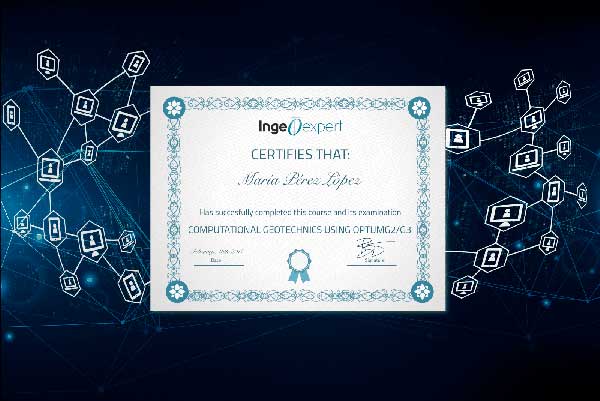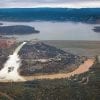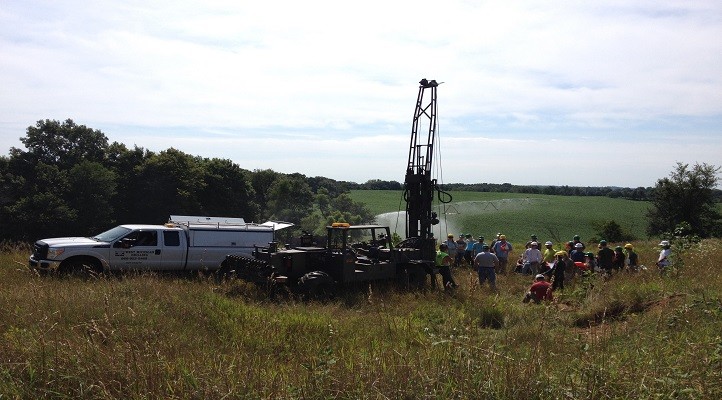Introduction to Drilling and Water Wells
Online course |
|
50 hours / 6 weeks |
|
Dates: to be determined |
Get access to our job listing after finishing the course
Introduction
Groundwater is one of the world’s most important and undervalued resources. Providing access to groundwater safely and efficiently is imperative to help sustain life on Earth as we know it. This course is designed to provide students with an overview of the principles and practices of water well drilling with an emphasis on drilling techniques, soil classification and well installations. A variety of drilling methods will be discussed including hollow and solid stem augers, rotary, sonic, direct-push, cable tool and hand drilling. An emphasis will be placed on the proper field identification, classification and description of earthen materials, sampling and logging procedures and the properties of soils and rock as they relate to groundwater and wells. The installation, completion and development techniques of water wells will be covered in detail including well materials, grouting, screens and proper well abandonment techniques.
Objectives
Students who complete this course successfully will be able to:
- Apply basic knowledge of drilling techniques to identify preferred methods of drilling available for the site-specific conditions.
- Design and construct a variety of water well systems dependent on the desired capacity and volume of water needed for a specific purpose.
- Work collaboratively as a team with a variety of specialized personnel including regulators, hydrogeologists, engineers and industrial drillers, drawing upon the strengths of each member, to safely and efficiently create water supply systems.
- Utilizing a variety of sampling methods and techniques to characterize earthen materials and use the information to create useful data reports.
- Take detailed field notes and use the site-specific data acquired to determine suitable well materials, development techniques and procedures for optimizing well efficiency and longevity.
- Begin to evaluate groundwater conditions to safely and sustainably extract and provide groundwater to a variety of consumers while ensuring the health and safety humans and the environment.
- Select appropriate techniques to economically acquire needed subsurface geological data.
- Solve problems encountered while doing field work and identify, analyze and resolve communication and ethical issues while advocating for sustainable solutions.
Limited places.
Module 1: Introduction to groundwater and wells
- – What is groundwater
- – Why do we drill?
- – What to do before we drill
- – Geophysical techniques
- – Site selection
- – Drilling safety
- – Historical overview
Module 2: Drilling methods
- – Hollow Stem Auger
- -Mud rotary
- -Air rotary
- -Reverse Circulation Hydraulic Rotary
- -Solid stem augers and bucket augers
- – Jet Drilling
- – Sonic drilling
- – Cone penetrometer testing
- – Direct Push type samplers
- – Cable tool
- – Hand auger
Module 3: Soil classification
- – Field classification and description of soils
- – Soil sampling techniques
- – Logging procedures
- – Properties of soils
- – Field identification of soils
- – Sampling and analysis plans
Module 4: Well installation
- – Well materials
- – Design components of wells
- – Well screens
- – Monitoring wells
- – Well Development
- – Well Grouting
- – Well abandonment
Module 5: Well maintenance and service work; Geological field work
- – Well maintenance
- – Well rehabilitation
- – Well abandonment
- – Pumping and testing
- – Field notes and documentation
- – Geologic communications
- – Site assessment and site safety
- – Environmental health and safety
- – Ethics and sustainable solutions
- – Problem solving
Module 6: Review for Final Exam
Disclaimer: The instructor reserves the right to make modifications to this information throughout the semester.
Tom Howe
Tom Howe is an experienced hydrogeologist with a wide breadth of theoretical and applied knowledge in the groundwater and related industries. He holds a bachelor’s degree in hydrogeology magna cum laude and a master’s degree in earth sciences from Western Michigan University where he currently serves as Senior Geosciences Specialist and director of their esteemed hydrogeology field course. Tom championed the development of one of the fist accredited certificate programs in applied hydrogeology and teaches graduate and undergraduate-level courses on a variety of geological topics including the principles and practices of well drilling and installation. He has safely trained hundreds of students from across the country and around the world. His courses introduce a variety of techniques and methods used in industrial drilling as well as site assessment, sample collection, description, coring, well logging, and well design, installation and development.
All of our courses are offered 100% online, through our intuitive Virtual Campus. Topics are taught through:
- – Videos
- – Interactive multimedia content
- – Live classes
- – Texts
- – Case studies
- – Evaluation exercises
- – Additional documentation
The content is updated in each new course edition, so that knowledge is acquired around the latest news and state-of-the-art geotechnical engineering technology.
One of the most interesting aspects of our courses is the use of live videoconferences, in which teachers and students interact in a continuous exchange of knowledge and problem solving. In addition to this, students can make use of the platform’s forum, a meeting point where they can interact with teachers and other students.
A tutoring system will also be established by email, which will resolve any possible doubts about the course, and which will serve as a point of connection for students with specific questions on each module.
Students can also download all course documentation, including texts, videos, video conferences and exercises.
Geologists, hydrogeologists, regulators, environmental scientists, or engineers who want to broaden their applied knowledge and skill set, or work in industrial drilling, consulting, water supply, or civil/geotechnical engineering.
At the end of the course, and as accreditation of knowledge acquired and of the technical and practical training, students who correctly complete the corresponding evaluation tests of the geotechnical engineering course will obtain an academic certificate issued by Ingeoexpert. This digital certificate is protected by Blockchain technology, making it unique and tamper-proof, thus enabling companies to verify its authenticity.
It can also be downloaded by students, forwarded by email and shared on social networks, as well as embedded on any website. You can see an example here.
Employment with any large or small consulting company, federal or state agency, or private industrial entity who needs personnel who understand hydrogeology.
I have an extensive cadre of professional contacts at firms including AECOM, Antea Group, Barrick, GHD, Cascade, Golder Associates, Stantec, GZA GeoEnvironmental, Arcadis, TetraTech, Terra Contracting and Wood; federal agencies including USGS, USEPA, DOD, US Navy, USDA Forest Service, USNPS and the US Army Corps of Engineers; industrial companies including Suez, ExxonMobil, Devon, Imperial Oil, Schlumberger, Pfizer, Baker Hughes, Occidental, Shell, and DTE; and state agencies including the Michigan Geological Survey, Indiana Dept. of Environmental Management, Ohio Geological Survey, Minnesota Pollution Control Agency, Tennessee Valley Authority, New York Geological Survey and Michigan Department of Great Lakes and Environment.
Get access to our job listing after finishing the course
Introduction
Groundwater is one of the world’s most important and undervalued resources. Providing access to groundwater safely and efficiently is imperative to help sustain life on Earth as we know it. This course is designed to provide students with an overview of the principles and practices of water well drilling with an emphasis on drilling techniques, soil classification and well installations. A variety of drilling methods will be discussed including hollow and solid stem augers, rotary, sonic, direct-push, cable tool and hand drilling. An emphasis will be placed on the proper field identification, classification and description of earthen materials, sampling and logging procedures and the properties of soils and rock as they relate to groundwater and wells. The installation, completion and development techniques of water wells will be covered in detail including well materials, grouting, screens and proper well abandonment techniques.
Objectives
Students who complete this course successfully will be able to:
- Apply basic knowledge of drilling techniques to identify preferred methods of drilling available for the site-specific conditions.
- Design and construct a variety of water well systems dependent on the desired capacity and volume of water needed for a specific purpose.
- Work collaboratively as a team with a variety of specialized personnel including regulators, hydrogeologists, engineers and industrial drillers, drawing upon the strengths of each member, to safely and efficiently create water supply systems.
- Utilizing a variety of sampling methods and techniques to characterize earthen materials and use the information to create useful data reports.
- Take detailed field notes and use the site-specific data acquired to determine suitable well materials, development techniques and procedures for optimizing well efficiency and longevity.
- Begin to evaluate groundwater conditions to safely and sustainably extract and provide groundwater to a variety of consumers while ensuring the health and safety humans and the environment.
- Select appropriate techniques to economically acquire needed subsurface geological data.
- Solve problems encountered while doing field work and identify, analyze and resolve communication and ethical issues while advocating for sustainable solutions.
Limited places.
Module 1: Introduction to groundwater and wells
- – What is groundwater
- – Why do we drill?
- – What to do before we drill
- – Geophysical techniques
- – Site selection
- – Drilling safety
- – Historical overview
Module 2: Drilling methods
- – Hollow Stem Auger
- -Mud rotary
- -Air rotary
- -Reverse Circulation Hydraulic Rotary
- -Solid stem augers and bucket augers
- – Jet Drilling
- – Sonic drilling
- – Cone penetrometer testing
- – Direct Push type samplers
- – Cable tool
- – Hand auger
Module 3: Soil classification
- – Field classification and description of soils
- – Soil sampling techniques
- – Logging procedures
- – Properties of soils
- – Field identification of soils
- – Sampling and analysis plans
Module 4: Well installation
- – Well materials
- – Design components of wells
- – Well screens
- – Monitoring wells
- – Well Development
- – Well Grouting
- – Well abandonment
Module 5: Well maintenance and service work; Geological field work
- – Well maintenance
- – Well rehabilitation
- – Well abandonment
- – Pumping and testing
- – Field notes and documentation
- – Geologic communications
- – Site assessment and site safety
- – Environmental health and safety
- – Ethics and sustainable solutions
- – Problem solving
Module 6: Review for Final Exam
Disclaimer: The instructor reserves the right to make modifications to this information throughout the semester.
Tom Howe
Tom Howe is an experienced hydrogeologist with a wide breadth of theoretical and applied knowledge in the groundwater and related industries. He holds a bachelor’s degree in hydrogeology magna cum laude and a master’s degree in earth sciences from Western Michigan University where he currently serves as Senior Geosciences Specialist and director of their esteemed hydrogeology field course. Tom championed the development of one of the fist accredited certificate programs in applied hydrogeology and teaches graduate and undergraduate-level courses on a variety of geological topics including the principles and practices of well drilling and installation. He has safely trained hundreds of students from across the country and around the world. His courses introduce a variety of techniques and methods used in industrial drilling as well as site assessment, sample collection, description, coring, well logging, and well design, installation and development.
All of our courses are offered 100% online, through our intuitive Virtual Campus. Topics are taught through:
- – Videos
- – Interactive multimedia content
- – Live classes
- – Texts
- – Case studies
- – Evaluation exercises
- – Additional documentation
The content is updated in each new course edition, so that knowledge is acquired around the latest news and state-of-the-art geotechnical engineering technology.
One of the most interesting aspects of our courses is the use of live videoconferences, in which teachers and students interact in a continuous exchange of knowledge and problem solving. In addition to this, students can make use of the platform’s forum, a meeting point where they can interact with teachers and other students.
A tutoring system will also be established by email, which will resolve any possible doubts about the course, and which will serve as a point of connection for students with specific questions on each module.
Students can also download all course documentation, including texts, videos, video conferences and exercises.
Geologists, hydrogeologists, regulators, environmental scientists, or engineers who want to broaden their applied knowledge and skill set, or work in industrial drilling, consulting, water supply, or civil/geotechnical engineering.
At the end of the course, and as accreditation of knowledge acquired and of the technical and practical training, students who correctly complete the corresponding evaluation tests of the geotechnical engineering course will obtain an academic certificate issued by Ingeoexpert. This digital certificate is protected by Blockchain technology, making it unique and tamper-proof, thus enabling companies to verify its authenticity.
It can also be downloaded by students, forwarded by email and shared on social networks, as well as embedded on any website. You can see an example here.
Employment with any large or small consulting company, federal or state agency, or private industrial entity who needs personnel who understand hydrogeology.
I have an extensive cadre of professional contacts at firms including AECOM, Antea Group, Barrick, GHD, Cascade, Golder Associates, Stantec, GZA GeoEnvironmental, Arcadis, TetraTech, Terra Contracting and Wood; federal agencies including USGS, USEPA, DOD, US Navy, USDA Forest Service, USNPS and the US Army Corps of Engineers; industrial companies including Suez, ExxonMobil, Devon, Imperial Oil, Schlumberger, Pfizer, Baker Hughes, Occidental, Shell, and DTE; and state agencies including the Michigan Geological Survey, Indiana Dept. of Environmental Management, Ohio Geological Survey, Minnesota Pollution Control Agency, Tennessee Valley Authority, New York Geological Survey and Michigan Department of Great Lakes and Environment.
More info
Finish this course and get a certificate based on Blockchain
Introduction to Drilling and Water Wells

Blockchain technology makes the certificate incorruptible, enabling companies to verifiy its autenticity.





Reviews
There are no reviews yet.